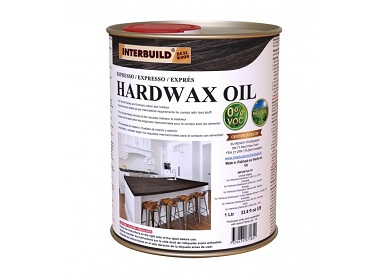 The wood treatment Hardwax Oil from Interbuild Global Distribution Ltd., contains no VOC (Volatile Organic Compounds). Additionally, it causes very little emissions of GreenHouse Gases.
The wood treatment Hardwax Oil from Interbuild Global Distribution Ltd., contains no VOC (Volatile Organic Compounds). Additionally, it causes very little emissions of GreenHouse Gases.
Early in 2021, globally acknowledged climate effect auditor South Pole performed a Life Cycle Analysis (LCA) of Interbuild’s Hardwax Oil. The group determined how much emissions the oil is causing during its lifetime from the sourcing of components all through to usage and disposal at the final customer.
Interbuild has compensated for the emissions actually caused. It has also committed to a plan for reducing of the already low emissions caused even further.
As a result of this, South Pole has formally approved that Interbuild can claim (and use their label confirming) that the Interbuild Hardwax Oil is Climate Neutral (Carbon Neutral).
Background
Interbuild is a global leader in solid wood countertops/worktops and furniture, primarily in high quality acacia wood.
The company treats all Interbuild solid wood products with it’s Hardwax Oil. This oil contains no thinner or other solvents (which is customary in wood treatment oils). It has the approval (by US FDA – Food and Drug Administration) to allow contact with food. It can therefore be used for all kinds of wood, indoor and outdoor. Project ranging from deck tiles, flooring and patio furniture to worktops/countertops for cutting boards in the kitchen.
The oil became so popular that it in 2018 was launched as a product to the end consumer. It was mostly in cans of 250 ml (8.45 fl oz US).
Interbuild’s Hardwax Oil
Including no VOC (Volatile Organic Compounds), the oil carries several major advantages:
- The user will have no headache, even after a long time working with the oil.
- Since a volatile component of other wood treatment oils evaporates when you apply the oil to the wood surface, Interbuild’s Hardwax Oil has a substantially better coverage than oils containing VOC. The oil contained in the 250 ml can typically covers 8 – 10 m2, making it pricewise a very competitive product for wood treatment.
- Since the oil contains no VOC solvents, which are very powerful GreenHouse gases, the climate impact on global warming from the Interbuild Hardwax Oil is very low.
Climate Neutrality
Early in 2020, Interbuild engaged South Pole as a globally leading Third Party climate related auditor. They asked South Pole to review the oil’s total effects on emissions of GreenHouse Gases. South Pole performed a LCA – Life Cycle Analysis “from cradle to grave.” This included all aspects from components, via production and transports to usage by end consumer.
South Pole determined the amount of CO2e (CO2-equivalents) that emit due to the oil (sourcing, production, transports and usage). Interbuild then paid for carbon offsets in order to compensate for the low emissions actually caused by the oil – as determined by South Pole. They then set a plan to reduce the already low emissions.
By the reduction plan and the offsets, Interbuild qualified the oil to be formally certified (in accordance with PAS 2060) by acknowledged auditor South Pole.
Climate Neutral vs Carbon Neutral
There is a difference between Climate Neutral and being Carbon Neutral. Carbon Neutral is considering only emissions of CO2. However, Climate Neutral also considers emissions of other, much more powerful GreenHouse Gases. These gases are methane and laughing gas. Climate Neutral is therefore more complete and is what PAS 2060 refers to.
Carbon Offsets in Gold Standard Project
The project, officially registered as being Gold Standard, in which Interbuild bought Carbon Offsets (also called Carbon Credits) is called Vietstar Municipal Solid Waste Treatment Plant. It is designed to reduce methane emissions from waste handling in Vietnam. This also improves social conditions by providing work opportunities. Additionally, it improves recycling of certain waste and composting of organic waste.
Reducing Carbon Emissions for Improved Sustainability
The management of Interbuild is very content taking this important step of sustainability. It is the hope that the market will appreciate having the choice to be able to use a wood treatment oil that is formally certified to have a net-zero of GreenHouse Gas emissions caused – low emissions to start with, a plan to further reduce emissions caused and compensating of emissions caused by investing in a socially responsible Gold Standard project.










